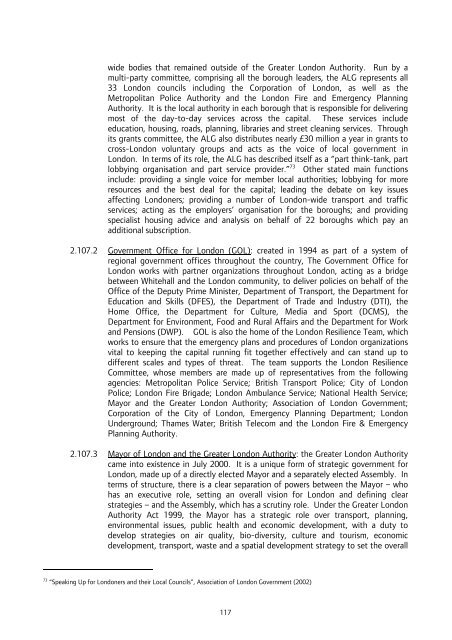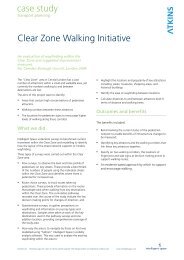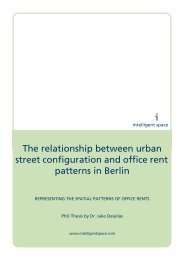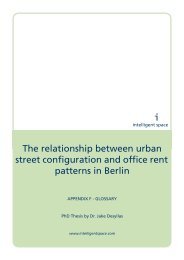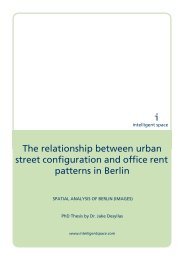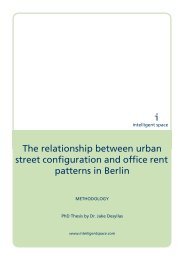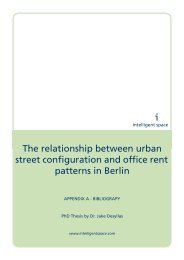Notting Hill Carnival Strategic Review - Intelligent Space
Notting Hill Carnival Strategic Review - Intelligent Space
Notting Hill Carnival Strategic Review - Intelligent Space
You also want an ePaper? Increase the reach of your titles
YUMPU automatically turns print PDFs into web optimized ePapers that Google loves.
wide bodies that remained outside of the Greater London Authority. Run by a<br />
multi-party committee, comprising all the borough leaders, the ALG represents all<br />
33 London councils including the Corporation of London, as well as the<br />
Metropolitan Police Authority and the London Fire and Emergency Planning<br />
Authority. It is the local authority in each borough that is responsible for delivering<br />
most of the day-to-day services across the capital. These services include<br />
education, housing, roads, planning, libraries and street cleaning services. Through<br />
its grants committee, the ALG also distributes nearly £30 million a year in grants to<br />
cross-London voluntary groups and acts as the voice of local government in<br />
London. In terms of its role, the ALG has described itself as a “part think-tank, part<br />
lobbying organisation and part service provider.” 73 Other stated main functions<br />
include: providing a single voice for member local authorities; lobbying for more<br />
resources and the best deal for the capital; leading the debate on key issues<br />
affecting Londoners; providing a number of London-wide transport and traffic<br />
services; acting as the employers’ organisation for the boroughs; and providing<br />
specialist housing advice and analysis on behalf of 22 boroughs which pay an<br />
additional subscription.<br />
2.107.2 Government Office for London (GOL): created in 1994 as part of a system of<br />
regional government offices throughout the country, The Government Office for<br />
London works with partner organizations throughout London, acting as a bridge<br />
between Whitehall and the London community, to deliver policies on behalf of the<br />
Office of the Deputy Prime Minister, Department of Transport, the Department for<br />
Education and Skills (DFES), the Department of Trade and Industry (DTI), the<br />
Home Office, the Department for Culture, Media and Sport (DCMS), the<br />
Department for Environment, Food and Rural Affairs and the Department for Work<br />
and Pensions (DWP). GOL is also the home of the London Resilience Team, which<br />
works to ensure that the emergency plans and procedures of London organizations<br />
vital to keeping the capital running fit together effectively and can stand up to<br />
different scales and types of threat. The team supports the London Resilience<br />
Committee, whose members are made up of representatives from the following<br />
agencies: Metropolitan Police Service; British Transport Police; City of London<br />
Police; London Fire Brigade; London Ambulance Service; National Health Service;<br />
Mayor and the Greater London Authority; Association of London Government;<br />
Corporation of the City of London, Emergency Planning Department; London<br />
Underground; Thames Water; British Telecom and the London Fire & Emergency<br />
Planning Authority.<br />
2.107.3 Mayor of London and the Greater London Authority: the Greater London Authority<br />
came into existence in July 2000. It is a unique form of strategic government for<br />
London, made up of a directly elected Mayor and a separately elected Assembly. In<br />
terms of structure, there is a clear separation of powers between the Mayor – who<br />
has an executive role, setting an overall vision for London and defining clear<br />
strategies – and the Assembly, which has a scrutiny role. Under the Greater London<br />
Authority Act 1999, the Mayor has a strategic role over transport, planning,<br />
environmental issues, public health and economic development, with a duty to<br />
develop strategies on air quality, bio-diversity, culture and tourism, economic<br />
development, transport, waste and a spatial development strategy to set the overall<br />
73<br />
“Speaking Up for Londoners and their Local Councils”, Association of London Government (2002)<br />
117


